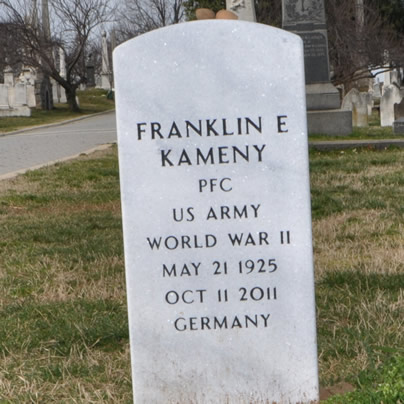Local
Kameny’s ashes remain in storage
Cemetery president proposes end to burial impasse


A headstone and a separate marker inscribed with Frank Kameny’s famous slogan ‘Gay is Good’ have been removed from his gravesite in Congressional Cemetery. (Blade photo by Michael Key)
Nearly 10 months after nationally acclaimed gay rights leader Frank Kameny died in his Washington home at the age of 86, an urn bearing his ashes continues to sit on a shelf in a storage vault in the headquarters building of D.C.’s historic Congressional Cemetery.
Cemetery officials said a dispute between Kameny’s estate and the D.C. gay charitable group Helping Our Brothers and Sisters (HOBS) over ownership rights to the plot where Kameny’s ashes were scheduled to be interred on March 2 forced the cancellation of the interment. HOBS purchased the plot earlier this year without consulting the estate, a development that the estate’s attorney says triggered the dispute.
The ashes, along with a headstone provided by the U.S. Veterans Administration recognizing Kameny’s military service during World War II and a separate marker inscribed with Kameny’s famous slogan “Gay is Good” have languished in storage at the cemetery since shortly after the interment was cancelled.
But in a surprise development on Wednesday, Congressional Cemetery’s new president, Paul Williams, disclosed in an email to the estate and HOBS that HOBS never had legal ownership rights to the Kameny plot because it failed to pay the balance on the purchase price.
“Because it had a balance, no deed was issued for the site to HOBS,” Williams said in his email.
“I propose we issue the deed directly to the estate (copy to HOBS) showing proof of ownership,” he wrote. “The estate would also need to sign an authorization of interment, which can be done at the same time. Then, we can replace the two stones in storage that we also have onsite and proceed with a private interment,” Williams wrote.
Glen Ackerman, an attorney representing the estate on behalf of Timothy Clark, whom Kameny named in his will as the main beneficiary of the estate, said the estate has accepted Williams’ proposal.
He said Williams’ disclosure that HOBS never had a deed to the cemetery plot and that the cemetery would issue the deed to the estate effectively ends the dispute by turning over the plot to Clark and the estate.
HOBS President Marvin Carter couldn’t immediately be reached Wednesday afternoon to comment on Williams’ disclosure that the cemetery planned to issue to the Kameny estate the deed to the cemetery plot.
Ackerman has said all along that the dispute centered on the estate’s desire to own the cemetery plot to ensure, among other things, that no one else would be buried or interred in the plot.
Under cemetery rules, two coffins and three urns may be buried or interred in Congressional Cemetery plots.
HOBS, which purchased the cemetery plot earlier this year from money donated by Kameny’s friends and admirers, has said it had no intention of burying others at the site.
Carter has said he and HOBS were always willing to transfer ownership of the plot to the estate. But people familiar with the dispute have said the point of contention was whether the estate should reimburse HOBS for the purchase price of the plot.
Ackerman has said Clark’s position was that donors from the LGBT community put up the money to buy the plot by giving it to HOBS, a non-profit group with tax-exempt status, so the donors could receive a tax deduction on their contribution. HOBS, in turn, made the purchase on behalf of the donors, the estate has maintained.
Meanwhile, the cemetery’s former interim director, Patrick Crowley, said he had the headstone and marker removed from the gravesite earlier this year until the estate and HOBS reached an agreement over final ownership of the plot.
Ackerman has said Clark and the estate became alarmed in February when a small group of Kameny friends announced in a press release that an interment ceremony for Kameny’s ashes would take place at the cemetery on March 3. Ackerman said organizers of the interment never consulted Clark or the estate, even though the estate had legal rights to the ashes.
Organizers of the interment ceremony abruptly cancelled the ceremony and burial the day before it was scheduled to take place on March 3, saying they did so out of “respect” for the Kameny estate. The urn bearing Kameny’s ashes has been in storage in the cemetery’s offices at 1801 E St., S.E. ever since that time.
The burial ceremony organizers, led by gay rights advocates and longtime Kameny friends Charles Francis and Bob Witeck, have said through intermediaries at the time that they invited Clark to participate in the ceremony and attempted to keep him informed of their plans. They said Ackerman refused to allow them to speak directly to Clark.
Gay activist and longtime Kameny friend Rick Rosendall, who was scheduled to speak at the Kameny interment ceremony, said it was his understanding that it was the estate’s “demand that no interment could be held until the deed to the burial plot was turned over to the estate that led to the event’s cancellation.”
Rosendall said he expressed his hope at the time that the dispute could be resolved. “That is still my hope,” he said.
Ackerman said the estate didn’t learn of the burial service until it obtained a copy of the organizers’ Feb. 13 press release announcing the ceremony.
He said the Kameny friends’ decision to organize the burial without initially consulting Clark or the estate created an atmosphere of mistrust between the two parties. Because of that, he said, Clark has insisted that ownership of the cemetery plot be transferred from HOBS to the estate without charge before the estate would consent to allowing the ashes to be buried.
Clark told the Blade in an interview earlier this year that he planned to keep half of the ashes and would donate the remaining half to be interred at Congressional Cemetery.
Francis and Witeck took initial possession of the ashes following Kameny’s death after Kameny’s sister, Edna Kameny, Kameny’s surviving next of kin, signed over power of attorney for Kameny’s remains to Witeck. Edna Kameny, who lives in New York and is in frail health, told the Blade she was pleased to entrust to Witeck and other Kameny friends the task of carrying out her brother’s stated wish to be cremated and to make funeral and memorial arrangements.
Once the details of Kameny’s will became known, including Clark’s role as personal representative or executor of the estate, Ackerman said it became clear that Clark and the estate should take possession of the ashes.
But when Clark sought to obtain possession of the ashes he said Francis told him the ashes had already been buried, a development that contributed to the mistrust between the estate and the Kameny friends organizing the burial.
Ackerman said it wasn’t until the estate saw the Feb. 13 press release announcing the interment ceremony at Congressional Cemetery that he and Clark learned the ashes had not, in fact, been buried.
When contacted on Wednesday, Francis said he had no comment on the matter, saying the dispute over the ashes is between the estate and HOBS and he has nothing to do with it.
Last week, Congressional Cemetery President Williams said he was hopeful that the dispute between the two parties would be resolved soon but said he couldn’t predict when that would happen.
“We have a little movement,” he told the Blade on July 27, saying negotiations were taking place between the estate and HOBS.
“It’s all confidential so far until everything’s signed. But I can tell you that the two parties have come to an agreement, that being the estate and Helping Our Brothers and Sisters.”

Before being removed earlier this year from this gravesite, the head and foot stones for Frank Kameny were located to the left and in front of head stone shown here, which marks the grave of another person. (Blade photo by Lou Chibbaro Jr.)
However, when reached two days later by phone, Carter told the Blade Williams had just informed him he had a proposal to resolve the dispute but that Williams did not provide any details about the proposal. Carter said Williams told him he would take steps to provide those details soon.
“HOBS has always been willing to work things out,” Carter said. “We’re not interested in continuing to own the gravesite.”
Carter told the Blade in a phone interview on July 29 that he had been out of town for the past few weeks and didn’t have a chance to check mail that may have been sent to HOBS.
“But no one from the estate has called me or emailed me about this recently,” he said. “They have my number and email address.”
Ackerman disputes this assertion, saying he and his law firm repeatedly sent written material to Carter by certified mail. He said the mail was returned to the law firm marked “refused” by recipient.
Maryland
Md. Commission on LGBTQIA+ Affairs released updated student recommendations
LGBTQ students report higher rates of bullying, suicide

The Maryland Commission on LGBTQIA+ Affairs has released updated recommendations on how the state’s schools can support LGBTQ students.
The updated 16-page document outlines eight “actionable recommendations” for Maryland schools, supplemented with data and links to additional resources. The recommendations are:
- Developing and passing a uniform statewide and comprehensive policy aimed at protecting “transgender, nonbinary, and gender expansive students” against discrimination. The recommendation lists minimum requirements for the policy to address: name, pronoun usage, and restroom access.
- Requiring all educators to receive training about the specific needs of LGBTQ students, by trained facilitators. The training’s “core competencies” include instruction on terminology, data, and support for students.
- Implementing LGBTQ-inclusive curricula and preventing book bans. The report highlights a “comprehensive sexual education curriculum” as specifically important in the overall education curriculum. It also states the curriculum will “provide all students with life-saving information about how to protect themselves and others in sexual and romantic situations.”
- Establishing Gender Sexuality Alliances “at all schools and in all grade levels.” This recommendation includes measures on how to adequately establish effective GSAs, such as campaign advertising, and official state resources that outline how to establish and maintain a GSA.
- Providing resources to students’ family members and supporters. This recommendation proposes partnering with local education agencies to provide “culturally responsive, LGBTQIA+ affirming family engagement initiatives.”
- Collecting statewide data on LGBTQ youth. The data on Maryland’s LGBTQ youth population is sparse and non-exhaustive, and this recommendation seeks to collect information to inform policy and programming across the state for LGBTQ youth.
- Hiring a full-time team at the Maryland Department of Education that focuses on LGBTQ student achievement. These employees would have specific duties that include “advising on local and state, and federal policy” as well as developing the LGBTQ curriculum, and organizing the data and family resources.
- Promoting and ensuring awareness of the 2024 guidelines to support LGBTQ students.
The commission has 21 members, with elections every year, and open volunteer positions. It was created in 2021 and amended in 2023 to add more members.
The Governor’s Office of Communication says the commission’s goal is “to serve LGBTQIA+ Marylanders by galvanizing community voices, researching and addressing challenges, and advocating for policies to advance equity and inclusion.”
The commission is tasked with coming up with yearly recommendations. This year’s aim “to ensure that every child can learn in a safe, inclusive, and supportive environment.”
The Human Rights Campaign’s most recent report on LGBTQ youth revealed that 46.1 percent of LGBTQ youth felt unsafe in some school settings. Those numbers are higher for transgender students, with 54.9 percent of them saying they feel unsafe in school.
Maryland’s High School Youth Risk Behavior Survey reveals a disparity in mental health issues and concerns among students who identify as LGBTQ, compared to those who are heterosexual. LGBTQ students report higher rates of bullying, feelings of hopelessness, and suicidal thoughts. Nearly 36 percent of LGBTQ students report they have a suicide plan, and 26.7 percent of respondents say they have attempted to die by suicide.
The commission’s recommendations seek to combat the mental health crisis among the state’s LGBTQ students. They are also a call for local and state governments to work towards implementing them.
Virginia
Va. lawmakers consider partial restoration of Ryan White funds
State Department of Health in 2025 cut $20 million from Part B program

The Virginia General Assembly is considering the partial restoration of HIV funding that the state’s Department of Health cut last year.
The Department of Health in 2025 cut $20 million — or 67 percent of total funding — from the Ryan White Part B program.
The funding cuts started with the Trump-Vance administration passing budget cuts to federal HIV screening and protection programs. Rebate issues between the Virginia Department of Health and the company that provides HIV medications began.
Advocates say the funding cuts have disproportionately impacted lower-income people.
The Ryan White HIV/AIDS Program, a federal program started in 1990, provides medical services, public education, and essential services. Part B offers 21 services, seven of which remained funded after the budget cuts.
Equality Virginia notes “in 2025, a 67 percent reduction severely destabilized HIV services across the commonwealth.”
Virginia lawmakers have approved two bills — House Bill 30 and Senate Bill 30 — that would partially restore the funding. The Ryan White cuts remain a concern among community members.
Both chambers of the General Assembly must review their proposed changes before lawmakers can adopt the bills.
“While these amendments aren’t a full restoration of what community-based organizations lost, this marks a critical step toward stabilizing care for thousands of Virginians living with HIV,” said Equality Virginia Executive Director Narissa Rahaman. “Equality Virginia plans to continue their contact with lawmakers and delegates through the conference and up until the passing of the budget.”
“We appreciate lawmakers from both sides of the aisle who recognized the urgency of this moment and will work to ensure funding remains in the final version signed by the governor,” added Rahaman.
District of Columbia
D.C. Black Pride theme, performers announced at ‘Speakeasy’
Durand Bernarr to headline 2026 programming

The Center for Black Equity held its 2026 DC Black Pride Theme Reveal event at Union Stage on Monday. The evening, a “Speakeasy Happy Hour,” was hosted by Anthony Oakes and featured performances by Lolita Leopard and Keith Angelo. The Center for Black Equity organizes DC Black Pride.
Kenya Hutton, Center for Black Equity president and CEO, spoke following the performances by Leopard and Angelo. Hutton announced this year’s theme for DC Black Pride: “New Black Renaissance.”
Performers for 2026 DC Black Pride were announced to be Bang Garcon, Be Steadwell, Jay Columbus, Bennu Byrd, Rue Pratt and Akeem Woods.
Singer-songwriter Durand Bernarr was announced as the headliner for the 2026 festivities. Bernerr gave brief remarks through a video played on the screen at the stage.
DC Black Pride is scheduled for May 22-25. For more information on DC Black Pride, visit dcblackpride.org.


















